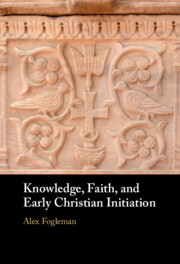7 results
Ecclesial Enculturation: John Westerhoff’s Appeal to Catechesis in Contemporary Theological Education
-
- Journal:
- Journal of Anglican Studies , First View
- Published online by Cambridge University Press:
- 23 November 2023, pp. 1-14
-
- Article
-
- You have access
- Open access
- HTML
- Export citation
9 - Cyprian, Scripture, and Socialisation: Forming Faith in the Catechumenate and Beyond
-
-
- Book:
- The Intellectual World of Late Antique Christianity
- Published online:
- 05 October 2023
- Print publication:
- 26 October 2023, pp 153-165
-
- Chapter
- Export citation
21 - Ambrose’s Hymns as Modes of Knowing the ‘Real’
-
-
- Book:
- The Intellectual World of Late Antique Christianity
- Published online:
- 05 October 2023
- Print publication:
- 26 October 2023, pp 388-403
-
- Chapter
- Export citation
Introduction
-
- Book:
- Knowledge, Faith, and Early Christian Initiation
- Published online:
- 11 October 2023
- Print publication:
- 19 October 2023, pp 1-18
-
- Chapter
-
- You have access
- Open access
- HTML
- Export citation
Chapter 13 - Preaching
- from Holy Ordinances
-
- Book:
- On Laudianism
- Published online:
- 05 October 2023
- Print publication:
- 19 October 2023, pp 173-178
-
- Chapter
- Export citation

Knowledge, Faith, and Early Christian Initiation
-
- Published online:
- 11 October 2023
- Print publication:
- 19 October 2023
-
- Book
-
- You have access
- Open access
- Export citation
Anger, Prayer, and the Transformation of Desire: Augustine's Catechumenate as an Emotion-Shaping Institution
-
- Journal:
- Church History / Volume 91 / Issue 2 / June 2022
- Published online by Cambridge University Press:
- 29 July 2022, pp. 227-244
- Print publication:
- June 2022
-
- Article
-
- You have access
- Open access
- HTML
- Export citation


